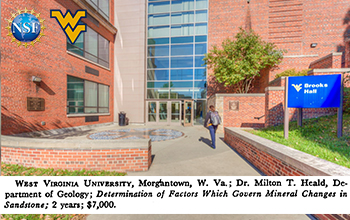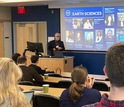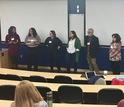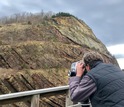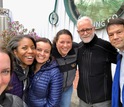NSF Earth Sciences Visits West Virginia University
April 16, 2019
Program Staff Travels to Home of One of NSF’s First-Ever Earth Sciences Grants
On the approach of National Science Foundation’s (NSF) 70th anniversary, ten Division of Earth Sciences’ program staff visited with more than 40 faculty and students at West Virginia University (WVU) in Morgantown, WV. The April 5 visit opened with an introduction by the WVU associate dean for research, followed by a presentation about NSF Earth Sciences from Section Head Steven Harlan and Program Director Jennifer Wade.
The visit heightened interaction among NSF program staff and university researchers, helping researchers become more familiar with NSF’s proposal and review process, and potential funding opportunities. Topics covered by NSF staff included: where NSF fits within the federal government; funding programs in Earth Sciences; proposal preparation and review; and general information about how to write the strongest proposal possible. Other highlights included:
- NSF's merit review process
- Essential proposal writing documents: Proposal & Award Policies & Procedure Guide (PAPPG NSF 19-1) and Solicitations
- Becoming an NSF reviewer
- Balancing broader impacts
NSF’s support of Earth Science research at WVU has a long, rich tradition. In fact, one of NSF’s first three Earth Sciences grants ever made in 1952 was to a geologist in WVU’s Department of Geology and Geography. In 1952, Milton Heald was provided $7,000 to determine factors governing mineral changes in sandstone.
Students attending the meeting were provided an overview of student opportunities, including the Research Experience for Undergraduates program, Graduate Research Fellowship Program, Earth Sciences Postdoctoral Fellowship, and internship and job opportunities at NSF headquarters.
Graham Andrews, WVU’s lead-faculty coordinator, said, “I know that everyone greatly enjoyed NSF’s visit and found it very positive, especially the student group.”
The morning concluded with one-on-one meetings between WVU faculty and NSF program directors. These conversations allowed faculty to explore proposal ideas.
Program Director for Geobiology and Low-temperature Geochemistry Phil Bennett shared, “Shortly after getting back to the office, I received an email from one of the WVU researchers. I was able to help him interpret language in an NSF solicitation and get him back on track with his proposal preparation. It was just the type of interaction I was hoping for after our visit.”
NSF Earth Sciences initiated a national series of campus visits to increase transparency and connection to the NSF science community at the recommendation of NSF Earth Sciences Committee of Visitors. A main mantra at the four completed visits thus far has been to encourage the research community to contact their program director with any questions or concerns related to the NSF funding process. Calls and emails to Earth Sciences program staff are always welcome!
If you would like timely news from the Division of Earth Sciences (EAR), subscribe to EAR Express Updates newsletter by sending a blank email to earth-subscribe-request@listserv.nsf.gov. You can unsubscribe at any time by emailing earth-unsubscribe-request@listserv.nsf.gov. Send updates and highlights about your NSF-funded research and education projects to EAR Communication.
The U.S. National Science Foundation propels the nation forward by advancing fundamental research in all fields of science and engineering. NSF supports research and people by providing facilities, instruments and funding to support their ingenuity and sustain the U.S. as a global leader in research and innovation. With a fiscal year 2023 budget of $9.5 billion, NSF funds reach all 50 states through grants to nearly 2,000 colleges, universities and institutions. Each year, NSF receives more than 40,000 competitive proposals and makes about 11,000 new awards. Those awards include support for cooperative research with industry, Arctic and Antarctic research and operations, and U.S. participation in international scientific efforts.
Connect with us online
NSF website: nsf.gov
NSF News: nsf.gov/news
For News Media: nsf.gov/news/newsroom
Statistics: nsf.gov/statistics/
Awards database: nsf.gov/awardsearch/
Follow us on social
Twitter: twitter.com/NSF
Facebook: facebook.com/US.NSF
Instagram: instagram.com/nsfgov

